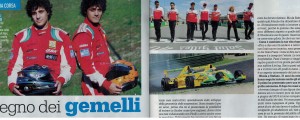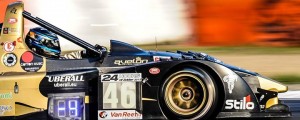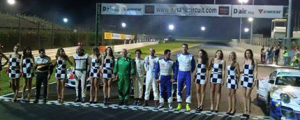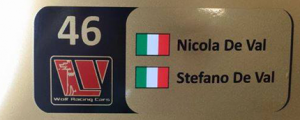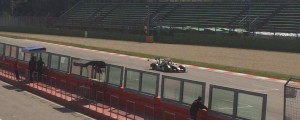 Nicola and Stefano De Val were born on 24 May 1989 in Sacile (PN), and they both are engineering students at Politecnico di Milano.
Nicola and Stefano De Val were born on 24 May 1989 in Sacile (PN), and they both are engineering students at Politecnico di Milano.
Not only they are engineers, but they are race drivers too: they started racing few years ago on very little formula cars, soon obtaining encouraging results, even compared to much more experienced drivers.
The interview was originally performed by the following Italian website: Iperattivo Categorico.
Welcome to our blog. Let us start with one of those questions I think you have been asked quite a lot: besides the name, how do your friends recognize you? I often have troubles doing such, sometimes I use the tone of voice, sometimes the way of speaking. Someone says you have different details: is it true or is it just mythology?
Nicola: There are a few details, but they are quite small. Based on my experience it takes a few days for a person who sees us constantly to recognize us both with no issues. People tend to struggle when they see us rarely, and one at a time, I guess then it’s impossible. Anyway if you see us from behind even our mother gets confused sometimes.
Stefano: To be honest when I look at my brother I see more differences than similarities. I think the only evident difference is Nicola’s dimple that appears when he smiles, but it’s true that for the biggest part our differences are small both in the expressions and in the gestures. Something that you see only after a discrete period of acquaintance. Typically after a week our new friends come to us and say: “so you are not actually that identical!”
You both have passion for cars and engines, and you are drivers too: a career which, until today, has always seen you unite. How did you passion begin, and how did you understand you wanted to become drivers? What was your first approach to races?
Nicola: My first passion involved cars rather than races. Of course the second includes the first one. Personally I remember at the primary school the day when I decided that being able to make a distinction between cars wasn’t enough and somehow I had to research deep into the technical aspects. Starting from there I slowly became more and more focused until I decided to go to university. Along with the pleasure of the technical knowledge came the interest in “fast” cars, and so the desire to try them. Luckily enough I still manage to do it!
Finally, the approach has been scientific all along, the truth is the race is just the realization of a work that’s maybe even much more important to me.
Stefano: Since we were little we’ve always had a genuine interest in noisy cars and decals. However I have to admit that the concretization of this interest is mostly because of Nicola, who first found Henry Morrogh racing courses, and then discovered F.Junior, the championship where we started. The first race was actually made to be the only one, just to give us the satisfaction of racing at least once. Contrary to the expectations (of the others) the race went so particularly well that our father decided to start looking for sponsors in order to allow us to race the next years.
During 2010 you raced in the Trofeo Cadetti Formula Junior Monza, one year later you entered the Challenge Italiano Formula Renault 2.0, then in 2012 you moved to Formula Renault 2.0 Alps and you are currently racing the Dunlop Supercar Challenge. Which one is the toughest one?
Nicola: The Alps for sure was really demanding because it was full of very prepared competitors. Most of them entered the Eurocup Formula Renault too, so there was a very high level of competition. It was interesting, instructive but very very difficult.
Stefano: The Alps, no doubts about it. That year we found ourselves in between drivers with very expensive race programs and with the only interest in becoming an F1 driver: the first 15 were doing two championships at the same time and there were 3 cars of red bull junior team. Unfortunately we weren’t expecting both preparation and program to be so different, so it soon became really difficult for us to be in the top ten, even if it happened sometimes. That championship was surely the toughest, still it was the most instructive.
You are 24 years old and have been racing for 4 years now: beside the classic “I’m Italian and I dream to race for Ferrari one day”, what goals do you want to achieve? Where do you want to end up?
Nicola: I would simply like to keep racing, in any category, as long as it has 4 wheels and happens inside a circuit. I like the idea of varying, you learn more from that. Today I think it is too difficult to plan anything else, high level championships require consistent budgets that are not easy to obtain.
Stefano: We are different compared to the typical driver. We are two engineers who are fast in a car, and not two drivers who also go to university. We are aware of the fact that this degree will have to be a big plus in our career and to me the best would be to make my engineering identity and my driver identity coexist.
At this moment endurance races interest me the most because they demand not only to be a competitive race driver, but also and mostly to be able to develop a car in order to make it a winning one. Who knows.
In the recent event of Assen you achieved a great result, earning lots of compliments: it surely was a day to remember. So, of which race you have the best memory? Of which, instead, the worst?
Nicola: Assen was a very interesting race, with lots of troubles during free practice and with very little time, but we managed to succeed anyway. Yet my best memory is my victory at RedBull Ring on the Formula Renault: it was the perfect race, dominated from start to finish.
My worst memory is Mugello, the same year, where we could not solve a temperature problem involving the rear tyres (it was very hot) and we ended race1 losing pieces from the tyres themselves, risking they could blow up.
Stefano: The most pleasant memory goes to my first victory at Varano in the Challenge Italiano F. Renault. I started second and after the first turn I was already first and running away for the next 25 minutes. The longest race of my life, but it felt so good to know I was the best that day, with the fastest lap, too! Great was the pleasure for having finally conquered the first place, and so was the emotion for the national anthem.
The worst one? Well the previous race at Misano. I suffered the pole position stress and the lack of free practice (I had to get my engineering degree), so during the first lap a damp mat at tramonto turn ended my race.
Until today you have always raced together, in the same teams. What if one team in the future will happen to be interested in only one of you two? What would the other one do? Would he try to find another team or would he completely change championship?
Nicola: Even inside the same team, we have always raced against each other. This year is an exception and in fact we race together, with the same car, but we always have been in competition. Certainly being in different teams would highlight their differences, it would be an interesting way of evaluating them! If the championship happens to be interesting I don’t see why one of the two should sacrifice.
Stefano: I have to admit I’ve always thought my driver-self to be solidly connected to Nicola, probably because until now our sponsors have followed the 2×1 package instead of following us independently. Future offers will be evaluated singularly and with soundness as we always did. Even if one of us happened to be much more interesting than the other, I don’t think that the other one would have any interest in being an obstacle. Anyway I think the most convenient thing for the teams is to have two drivers who work outstandingly together.
Please be honest: what do you think are, inside the car, your strengths and weaknesses? What about the other?
Nicola: On fast tracks without demanding braking applications I tend to be better: I’m not the best at braking but I tend to have a higher minimum speed inside the corner. Stefano, instead, always manages to brake 5m later than me, so if the track requires mostly hard braking and has slow corners he’s usually faster. I guess his answer is identical.
Stefano: A good thing about my approach is that right amount of aggressiveness that often permits me to start with the right foot every time I jump in the car. About my weaknesses, even if every driver has this issue in greater or smaller manner, I’d like to suffer less the stress 5 minutes before the start, on the grid.
In my opinion Nicola has to work a bit on the close contact: it often happens that when he wants to overtake someone he find himself slowed down because he doesn’t want to take any risks, ending up being too gentle on the other driver. On the other hand I envy his ability to bring so much speed inside the corner, particularly the fast ones. Typically what I gain during braking I loose in the middle of the corner, and at the end we’re even, clearly.
You both are students of Mechanical Engineering at Politecnico di Milano: How does the study go? What would you want to do, after getting your degree? Most importantly, which one is better?
Nicola: Studying was interesting until some time ago, now, especially with the thesis, I’m lost in abstracts aspects I’m not keen on. In the future I’d like to come back a bit into something more practical. I don’t remember his average mark as they’ve always been very similar but let’s say at the end of the day he managed to keep more attention than me.
Stefano: We completed our list of exams on July, so we are preparing to get our degree on December. Diplomatically the average mark is very high for both. As far as I’m concerned it’s almost a year since I’ve started working together with the R&D department of Pirelli because of my thesis and I must admit I would fancy a job that has flexibility on his side. Anyway it could be anything between a tester, a driver, a race engineer or designer as long as it has to deal with cars.
Two typical questions to end with: could you please name three characters, or people that marked your life?
Nicola: I have met a lot of car fans until today, and it’s them that are able to convince you it is worth to keep on working. More than just a single name, it is the whole category that is helping me.
Stefano: This one is not easy.
– Colin Chapman, because if today you don’t have a monocoque you are a nobody, but when he made the first one nobody understood the principle.
– Giacomo Augusto Pignone e Ugo Romolo Vercelli through their book “Motori ad alta potenza specifica” which excited my knowledge as an adolescent.
– Andrea Curami, professor of the applied mechanics course at Politecnico di Milano, for his talent and passion in teaching.
Finally, what is the most important value to you?
Nicola: Coherence. Of course one should have the liberty to change opinion, but with reason.
Stefano: Empathy. When I entered the racing world I understood that the role of a driver is not only to win races, but to be the glue connecting the whole team made of people and mechanical components. You don’t go anywhere as a team if you’re not unite chasing the same goal, both in races and in the working world.
